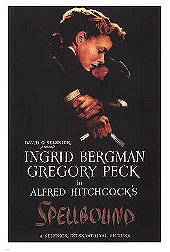Spellbound seems almost quaint and naïve with its understandings and handlings of complicated psychological issues, and psychiatry as a whole. But that doesn’t prevent it from being a thoroughly enjoyable and engaging thriller from the master of that particular genre, Hitchcock. (No first name is necessary.) Luckily Hitchcock armed himself with two great actors for his lead roles, gave them a brilliantly crafted dream sequence designed by Salvador Dali, and never strayed too far from his tried and true formula. I wouldn’t call it a classic, but it’s very solid throughout. In fact, the more I thought about it, the more I seemed to enjoy it.
Spellbound is mostly a psychological melodrama, but there’s always a sinister undercurrent going on through out. An undercurrent that frequently threatens to come exploding out from various characters, including matinee idol lead Gregory Peck. The story concerns itself with Peck’s character, an amnesiac who assumes the identity of a well-known and respected psychiatrist who is set to take over the institution that Ingrid Bergman’s intelligent but emotionally disconnected doctor works at. Soon things such as office relations propriety and standards of conduct go out the door. They yearn for each other so they act upon it. But she notices something is slightly off about her new friend. Should she try and help him heal his wounds and discover the sinister undercurrents going on in his mind or should she turn him in? Well, there wouldn’t be much a movie if she did the latter.
Of course the bulk of the movie takes place in the grand tradition of Hitchcock films – that is, a woman who helps the lead solve a mysterious case and heal his emotional wounds through her love and support. Rear Window was brilliant at taking this basic frame and running wild with it. To Catch a Thief did something similar, but was more frothy and knowingly winking to its audience. Spellbound never quite reaches the brilliance of Window, but comes close to Thief’s suspense/mystery/romance good times.
Bergman’s character is a workaholic who takes no time for herself; she is a dedicated and intelligent woman who has a lot to prove. Not only is she an educated professional in a male dominated world, she’s doing all of this in 1945. She has to be five times as strong, tough and smart as the next male competitor. She might not want to be the head of the hospital, but she does want to be one of the best. Naturally, and you see this quite often in real life, she has ignored such things as a private, romantic and social life. She is her work. She takes one look at Gregory Peck and gets all school-girl weak in the knees. But who wouldn’t? The performance she delivers is typically strong, not just for her, but for her partnership with Hitchcock. It doesn’t surpass her performance in Notorious, but it’s a very solid piece of work. By freeing him from his guilt complex, curing him of his amnesia and, finally, proving his innocence, she has done everything that Grace Kelly did for Cary Grant and James Stewart, but with a more proactive stance in the plot. The movie might just be hers in the end.
And what of Gregory Peck? Unfairly, his reputation as an actor has never really been as well-considered as his reputation as a great movie star or moral person. To see his work in Gentlemen’s Agreement, To Kill a Mockingbird and in this film is to see his range. He could be stoic; he could stand for moral and righteous indignation with an authority and grace that is greatly missing from films today. But, especially in this film, he could subvert that nice-guy/handsome leading-man persona into something twisted. There is a reaction shot where his face is ablaze with something that resembles demonic possession, it is not big and flashy, like much of Peck’s work it’s quiet and small but it plays so wonderfully. And the way he can switch back and forth from tortured soul to romantic hero to mysterious rogue in the blink of an eye should put any questions about his acting ability to rest. The way the plot maneuvers sets him up as the Sleeping Beauty who can only be freed from true love’s kiss. The fact that it is a three-pronged kiss only makes the movie that much more interesting.
Dialogue too often explains complex psychological issues in overly simplified and contrite terms, but that’s not entirely the scripts fault. Again, this was made in 1945. Psychiatric evaluations were still a relatively new science. As a culture we were only beginning to discover just how crazy and complicated we are. But try as it might, it never fully overcomes this hurdle. Realizing what is causing your guilt complex doesn’t cure you; it’s only the first steps towards emotional and mental health. When I first viewed the film I couldn’t get past this hurdle. I kept tripping up over it, but I kept thinking about sequences and ideas and moments in the film. The more I thought about it, the more I realized that is was a love story, like many of Hitchcock’s films, wrapped in suspenseful melodrama with psychological issues as an added flavor. Then it all made sense and a enjoyed it more.
It may take some work to go with it, possibly even multiple viewings, but Spellbound is well worth even the most cursory of glances if only to view the dream sequence. Salvador Dali, one of my favorite visual artists, created something so cerebral and bizarre that it can only be described as beautiful. It’s possibly the most authentic visualization of dream that I’ve seen in a film. The way that symbols take over, that faces become blurred, how you randomly shift from one place to another with no explanation – it’s all right there, complete with his visual wit.
 Login
Login